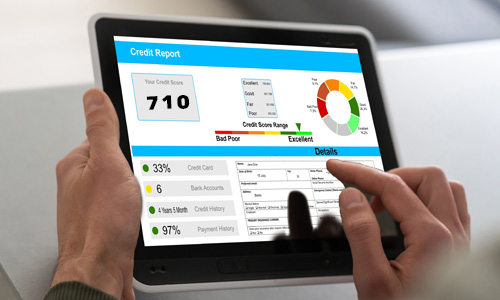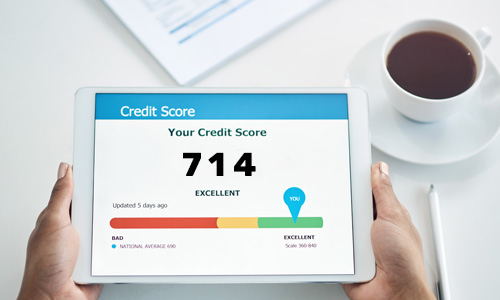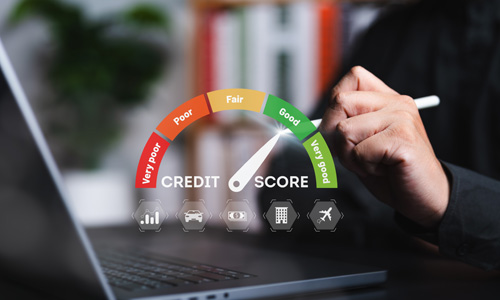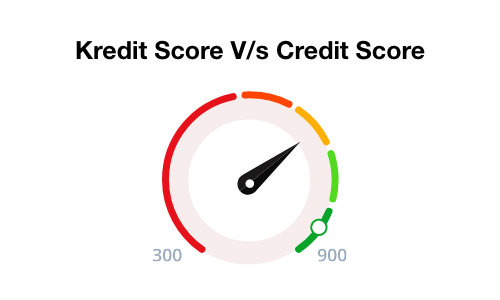Credit Score You Need to Buy a House in 2025
With numerous excellent options available in the UAE, home loans are becoming an increasingly popular choice for financing the purchase of homes in the country. However, applying for a home loan doesn’t equate to approval, as there are several factors considered by the bank regarding one’s application.
The first thing all banks and financial lenders check before providing you with a loan is your credit score. A credit score is a three-digit value evaluated for each individual based on their financial activities like credit utilisation, debt repayment history, on-time or delayed bill payments, number of active loans, etc.
As credit score plays a significant role in getting a mortgage approved by your chosen bank, it is recommended to fulfil the credit score needed for a mortgage to get your desired amount at lower interest rates.
In this post, we will go through all the major aspects related to credit scores for home loans. Here, you will also get to know various effective ways of improving your credit score to get a mortgage without any hassle.
What Factors Are Considered When Calculating the Credit Score?
A good credit score is needed for a mortgage in the UAE. Here is a list of factors considered by the banks and other financial lenders when calculating your credit score:
- Debt Repayments
- Number of Credit Cards
- Number of Bank Accounts
- Number of Credit Inquiries
- Missed credit card Payments
- Credit Utilisation
- Debt-to-Income Ratio
- Applying for a Loan Repeatedly
Debt Repayments
Make sure you pay all your debts on or before the scheduled time to have a good credit score. As paying your debts and loan EMIs on or before the due date can leave a positive impact on your credit score you must avoid irregular payments to maintain your credit score .
Number of Credit Cards
Banks and other financial lenders examine the number of active credit cards and loans while calculating your credit score. Having too many credit cards and poor repayment history in most of them can negatively affect your credit card application.
Number of Bank Accounts
There is no harm in having multiple bank accounts. At the same time, leaving them dormant without using them can lead to a reduction in your credit score.
Number of Credit Inquiries
While awareness is key to a good credit score, contacting the banking help and support line multiple times just to find answers to credit-related queries can impact your credit score in a negative manner. Thus, it is recommended to visit the bank’s website and perform research there to find answers to your queries.
Missed Credit Card Payments
Multiple missed or delayed credit card payments indicate that you are an irresponsible borrower who is unable to manage your financial requirements. In order to make timely payments, you can activate standing instructions in your bank account by calling the help and support line. With standing instructions, your monthly payments get deducted automatically, and you need not remember to pay them every month.
Credit Utilisation
Over credit utilisation can also take another hit on your credit score. You should ensure that you are keeping a track of your credit card usage by going through text notifications or logging into the concerned bank’s online or mobile banking portal.
Debt-to-Income Ratio
A good debt-to-income ratio can help you improve your credit score in UAE. It demonstrates that besides proper management, you also avail of debts after proper calculation based on your salary. Consequently, you should use the credit within a certain limit of your monthly earnings.
Applying for a Loan Repeatedly
All financial institutions in the UAE maintain records of all applications, and this includes rejected applications as well. If you apply for a credit card or a loan and get rejected multiple times, this is added to your report which can reduce your credit score. Thus, you should only apply for credit cards or loans for which you are eligible and capable of paying back.
| Check your AECB Credit Score |
What Credit Score Is Needed for Mortgage in UAE
Generally, you will need a credit score of more than 710 to get a home loan and buy a house without any hassle in the UAE. However, some home loan providers offer loan facilities at a credit score of around 570 points as well.
This can be considered is the minimum amount of credit score needed for a mortgage in the UAE. A credit score of less than 570 is considered a poor credit score and people with such a credit score face multiple challenges in getting their personal or home loan applications approved.
Having said that, you can always learn how to can improve your credit score if you have it low. Before exploring those steps later in this article, let’s first check out how home loan applications are affected by your credit score.
While a credit score may not be directly related to your loan application, it surely does make a difference when it comes to helping you get a home loan to buy your dream house. A good credit score shows that you are a responsible borrower as you have made all your bill payments on time and repaid all your debts based on the provided schedule.
On the other hand, a bad credit score shows that you have not been able to manage your finances for a long time and have missed out on plenty of monthly payments. Whereas a good credit score influences the bank to provide you with a loan, a bad credit score can make them reject your application.
Other Factors Affecting Your Home Loan Application
Here are a few factors other than your credit score that affect your home loan application.
Debt-to-Income Ratio
Besides various other factors, your debt-to-income ratio is one aspect that banks consider while approving your home loan application. The debt-to-income ratio helps your lender understand whether you will be able to repay the loan amount while managing other financial requirements. A debt-to-income ratio ranging between 20 and 35 per cent is generally considered worthy of home loans. The debt-to-income ratio of more than 35 per cent, on the flip side, is considered risky by most home loan lenders.
Location and Other Details of the Chosen Property
Home loans are unsecured loans, meaning that you need not provide any collateral in exchange for securing the loan. When it comes to applying for a home loan, your chosen property is considered collateral itself. In the case of home loans, the bank takes your purchased property under consideration while approving your loan application. The only condition required here is that the selected property should have a good value with a strong possibility for increment in the near future. If you choose a property that is more prone to a fall in the value due to any reason, it may cause difficulty in getting your loan application approved.
Employment Status
Your employment status considerably affects your home loan application, with the duration of your employment and the type of your occupation also being noted. Assuring your bank that you are working in a good company and are capable of holding a stable job for long can present you as a financially stable candidate for getting a home loan.
Credit History
The way you manage your existing debts and other financial requirements are mentioned in your credit history. From your monthly credit card bills to small utility bills, loans, cheques, bank accounts, etc., everything is taken into account. The financial lenders (including banks) in the UAE take note of this information to understand whether you are prompt with your payments. It should be noted that your credit score for home loans also comprises your credit history to a great extent.
Applicant’s Age
Home loans are long-term loans, with an exceptional tenure of up to 30 years in most cases. This is the reason why the bank considers your age before providing you with a home loan. The ultimate goal for the same is to determine the remaining earning years of the applicant. As per the banks, if the borrower is to retire soon, they will not have an active source of income and may fail to repay the home loan on time. However, if they have a co-borrower signed on the home loan application, the bank may provide some relaxation on the age factor.
Number of Active Loans and Credits
Your home loan application is greatly impacted by the number of active loans and credits you have. As other credit liabilities can split your income and leave a reduced amount to pay for the mortgage payments, most lenders check if you have any other active loans or credit liabilities.
Can You Have a Bad Credit Score to Get a Mortgage?
Yes, it is possible to get a home loan with a bad credit score. However, it is difficult and comes with various challenges at every step of the application approval process. It should be remembered that even if people with a bad credit score can secure a mortgage, they may get a lower loan amount with higher interest rates compared to the ones with a good credit score.
A bad credit score is not developed overnight. It is a score accumulated over considerable time, implying that you have a long history of missing out on your payments and higher running debts. And it’s only natural that not all the lenders will agree to take this much risk. However, there are some institutions that offer loans in exchange for some collateral or security in exchange. In case you are one of the applicants with no collateral available, you may be required to pay more to qualify for the loan or mortgage.
How You Can Improve Your Credit Score to Get a Mortgage?
As you will require a good credit score to get a mortgage in the UAE, here are a few measures that you can take to enhance your credit score if you find it on the lower end.
Ensure Timely Debt Repayments
The most effective way to improve your credit score is to make timely debt repayments. You must consider paying all your monthly bills and other instalments on or before the due date. If you tend to forget the due dates, the best way to do this is to activate standing instructions in your bank account. You can easily activate the service by logging into your online or mobile banking account. You can also contact your bank to activate the service.
Make Some Extra Deposits
An easy way to achieve our goal is to make extra deposits in your credit card account. You can do this by paying an extra amount in addition to the monthly outstanding amount of your credit card billing cycle. This helps you enhance your credit score by simply paying the remaining amount and getting rid of your debts.
Getting a New Credit Card
You can always consider getting a new credit card to increase your credit score and your available credit limit. If you have an active loan and not a credit card, that doesn’t mean that you have a high credit score. As your credit score gets impacted by loan repayment activities, making delayed loan repayments can also impact your credit score negatively. Consequently, you must start making on-time payments to enhance your credit score to get a mortgage without any hassle.
Clearing Existing Dues
Clear out all your existing dues and make repayments on or before the due date to improve your credit score. You can use various available options like personal loans, balance transfers, cash in advance, etc., to pay off your existing debts.
Checking Your Credit Report
You should consider going through your credit report on a frequent basis to check if the authority has created it right to maintain a good credit score. This helps you rectify errors and ensure the correctness of the details in the report.
Manage Existing Credit Cards
Make sure you keep using all your credit cards and not leave any one of them dormant. Your usage and payment schedule are also included in your credit report. Consequently, if you close or deactivate an unused credit card abruptly, your credit score can fall.
Multiple Loan Applications
It is highly recommended to not apply for multiple credit cards or loans simultaneously. Getting your loan or a credit card application rejected can also affect your credit score. In case of credit card application rejection, you must try to check if you have a good debt burden ratio, if you have submitted the right set of documents, and if you have a healthy credit score. Getting an application rejected can impact your credit score, and having it multiple times at once can exacerbate that damage.
Key Takeaways
- A good credit score can help you get a home loan without any delay.
- Make timely payment for all your dues to maintain a good credit score.
- Explore various loan options before applying for one at the end.
- Ensure checking your credit report once every month to keep track of the same.
- Don’t forget to check the eligibility criteria for the home loan you are applying for to avoid any rejection of the application.
- You can check the credit score needed for mortgage in our home loans section.
- Visit our home loans section or contact our help and support line in case you have any questions.
| Credit Score for different types of Loan | |||
|---|---|---|---|
| Credit Score for Personal Loan | Credit Score for House Loan | Credit Score for Car Loan | Credit Score for Student Loan |

More From Credit Score
- Recent Articles
- Popular Articles












